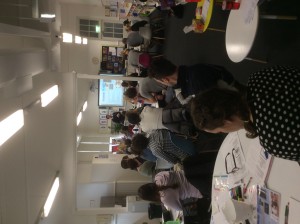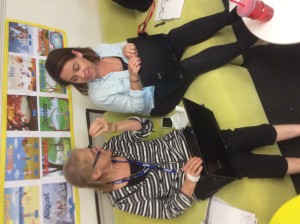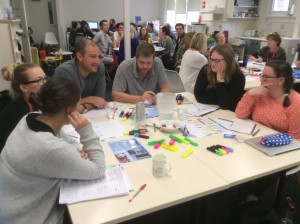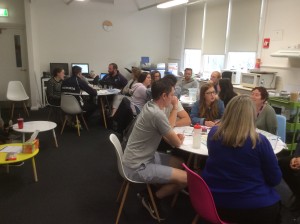Over the next few weeks you may hear your child talking about VCOP, playing “Kung Fu Punctuation” or talking about their “Big Write”. These are all elements of the professional learning our teaching staff and, our colleagues from Bentleigh East and Pinewood Primary School engaged in last Tuesday.
Ros Wilson is the creator of The Big Write. She has developed a way of teaching writing to children which focuses on four main aspects of writing – Vocabulary, Connectives, Openers and Punctuation (VCOP). Through weekly writing sessions (known as Big Writing), children will develop their skills in these areas, as well as learning about and revising several different genres, therefore improving their overall writing ability.
We will soon begin VCOP activities and will introduce regular ‘Big Write’ sessions. We are sure that the children’s enthusiasm for writing will increase along with their confidence. They will become better at improving their own writing through self-assessment and develop a greater understanding of the writing process.
The Four Elements of the Big Write (VCOP)
Vocabulary
In this area we promote the use of “WOW” words in their writing. These are words which are ambitious for the children to use. We encourage the children to look for “WOW” words in their reading of texts, (for example, reading books, novels read at home) and we also highlight the fact that “WOW” words can be found in conversations (for example, on TV or with friends and/or family).
It’s really easy to help your child with this. Read with them and to them. Share “WOW” words from your own reading and tell them words which you would use in different situations.
Connectives
Connectives make sentences longer because they join pieces of information together. The children are aware that there are different levels of connectives; therefore they are able to develop their writing appropriately. We ask the children to use connectives at the beginning of sentences so they can be used as sentence openers too.
How can you help?
Discuss different connectives with your child. Match connectives together. For example, which connectives could be used instead of “and”? Talk about making sentences longer and more interesting by using a range of connectives – not simply and / but / because.
Openers
There are different ways of opening sentences. Younger children will use words like I / Then / They. We want to encourage the children to think of other words to use. Older children will be introduced to “Power Openers”.
Here we ask the children to use connectives to start sentences. We would develop their skills by showing them how to use words ending with ly, ing or ed. (For example; Amazingly, John was happy to get on with his work).
Ideas on how to help with Openers
Spend time discussing different ways to start sentences. Use verbs and adjectives to describe what people are doing and make up a sentence with the verb / adjective at the beginning e.g. Walking home from school one day, I saw a massive dog. Huffily he agreed to complete his homework. Opening words ending in ly or ing are called… POWER OPENERS!
Punctuation
We show the children different forms of punctuation and give them examples of how to use them. Punctuation is differentiated into levels. The children play lots of games using the learning and to explain their thoughts.
Thank you once again to our families for supporting our professional learning day. We look forward to seeing the impact this engaging program has on our student’s acheivement in writing.




